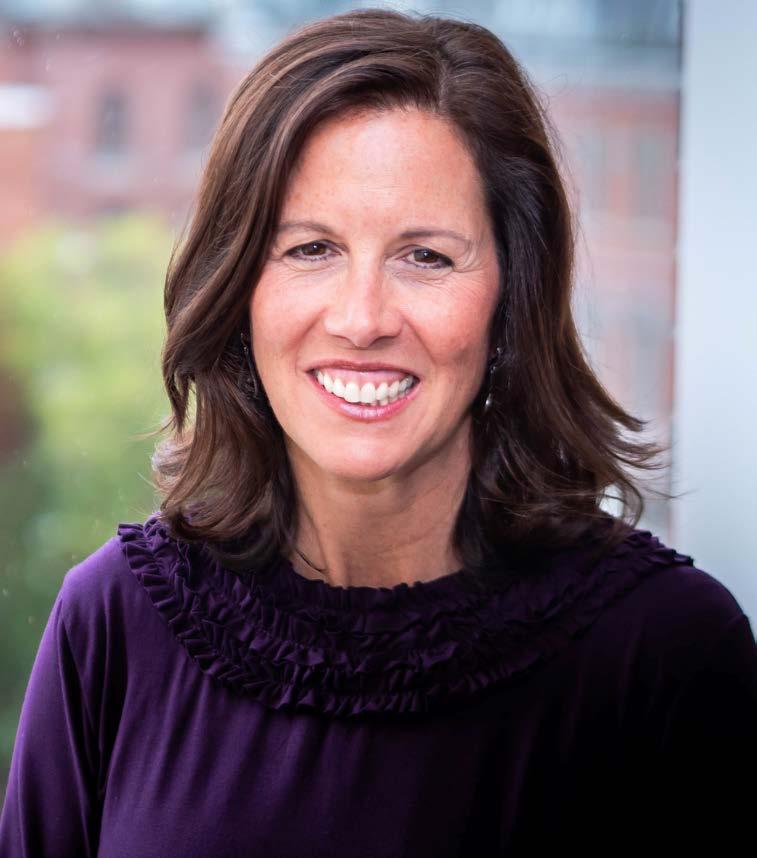
4 minute read
Q&A with Bernstein Shur CEO Joan Fortin
BY JEFF FEINGOLD
In April 2019, Joan Fortin became CEO of the law firm Bernstein Shur, which has offices in Portland and Augusta, Maine, and in the Manchester Millyard. She is the first woman to run the 105-year-old firm. Before becoming CEO, she focused her practice on land use, municipal law, tax increment financing and wind energy development projects.
Q. How long have you been at Bernstein Shur?
A. A little over 20 years. I’ll tell you why I chuckle when people ask me that question. I came as a student, a law student, went back to law school, graduated, clerked, went to the firm. Then, within a year, quit and moved to Alaska, and worked there for a year, and then came back. I’ve been back since ‘99.
Q. What’s the split now between women attorneys and male attorneys?
A. We follow the same trend as you’ll see nationally. We hire at roughly equal levels. Then you go up the levels, from junior associate to senior associate to non-equity shareholder to equity shareholder. But, basically, across the nation, law firms bleed out women at every step of the way. Those numbers bear out in our firm as well. We’re probably roughly equal numbers of men and women as junior associates, but by the time you get to equity shareholders, maybe we’re 25%.
Q. The reason for that falloff?
A. That is the million-dollar question, and people disagree. Some would say, “Well, women have children, and then they don’t want to work anymore.” I don’t think that’s exactly what it is. I just think there’s a whole variety of things that come into play that make it hard for women to stay.
Q. What are you doing about that?
A. Part of it is just cultural. We’re trying to make sure that we have an environment where people feel safe and respected, like most employers today. Familyfriendly policies are really important to me, and it’s important that it’s for men and women. Because we normalize professionals having children as something that men engage in and women engage in, it’ll decrease the stigma of women who need to leave early and take care of their child.
Some of the stuff we’ve done the last couple years. We have a very progressive parental leave policy. Just broadly, we have a policy that provides 16 weeks of paid leave for all new parents: male, female, same-sex couples, birth, adoption, foster care. We also took away a couple of barriers. One is you used to have to work at the firm a year before it applied, and that’s gone.
Q. You focused your practice on tax increment financing districts, or TIFs. Could you explain what they are best used for?
A. I represented both municipalities and private developers for many years on TIFs, and I always tell them the same thing — the TIF statute is best used to help municipalities foster economic development.
In Maine, they’re used in different ways. For example, in Portland, it was used to develop Thompson’s Point. It was a blighted site that no one was developing for a long, long time, because it just needed too much. I worked with a private client to get a TIF district set up. The whole peninsula is a TIF district now and there are restaurants, theaters, museums and major events there. That’s economic development that benefits the city that would’ve never happened, but the TIF was able to provide an economic incentive for someone to take that on.
Another example is if a municipality wants to attract development. For example, if a town wants to create a business park. One of the things they’ll do is put a TIF district on it, and then use the new value to pay for laying power, water and sewer, all the infrastructure needed, so that you’ve got pad level sites. It’s a lot more attractive to a new company if all they need to do is build from the ground up.
Q. What do you think the economic climate is going forward for the legal industry, especially considering the coronavirus?
A. Well, I have been feeling very bullish about it, and I’m very excited about the next couple years. Our lawyers have been very, very busy, and there are a lot of deals in the pipeline. But you asked the question that is now going to start keeping me up at night: What is the coronavirus going to do to legal demand? I think what we’re learning right now is everyone’s trying to figure out how to do as much work as you can remotely. People who have a business are not going to stop, people who are trying to build a business are not going to stop, and so it might be hardest for the people who have practices that involve smaller walk-in clients, people that need to come and meet face-to-face with their lawyer — that might be harder, depending on what happens with the social distancing.










